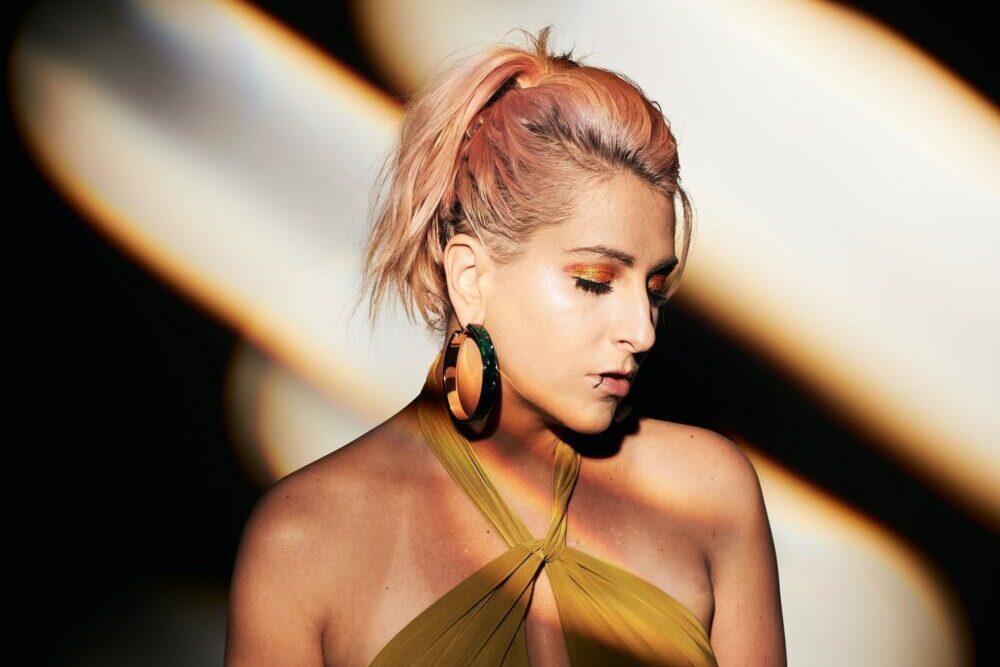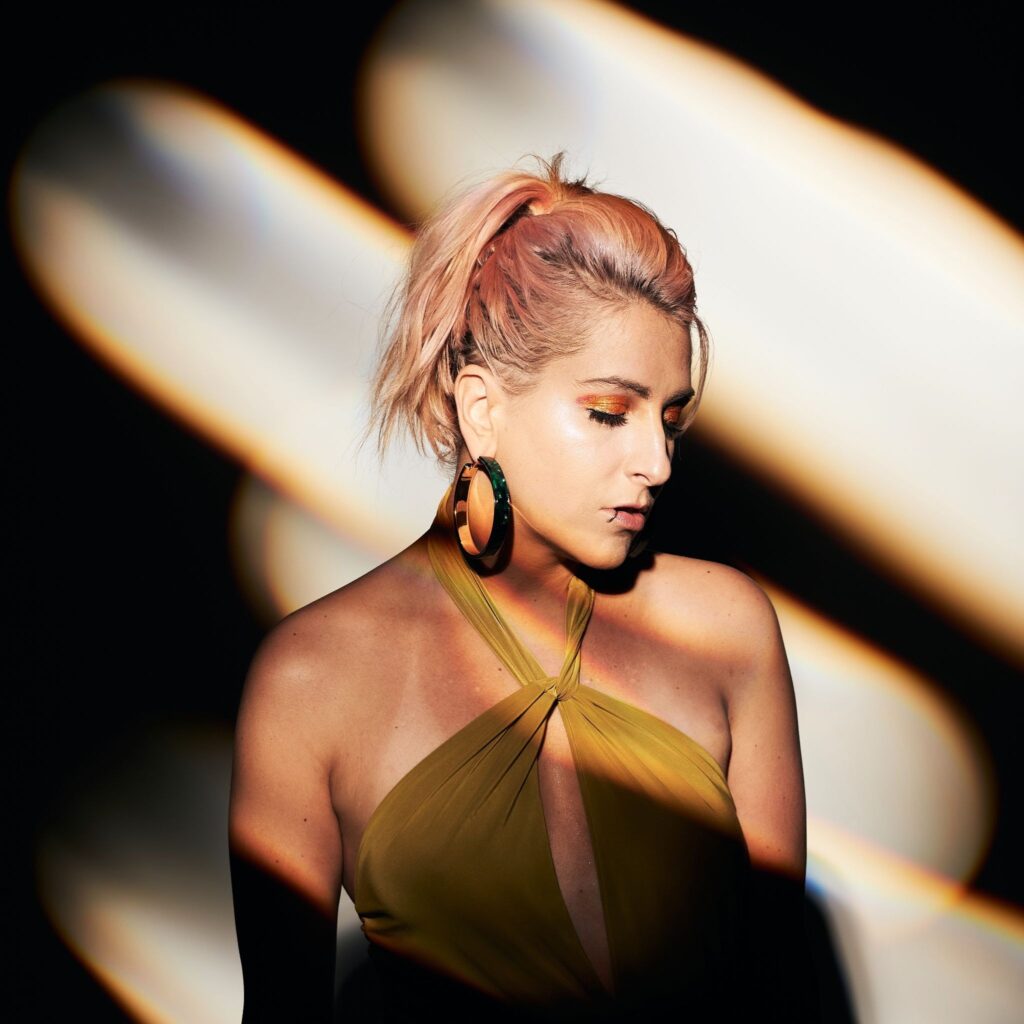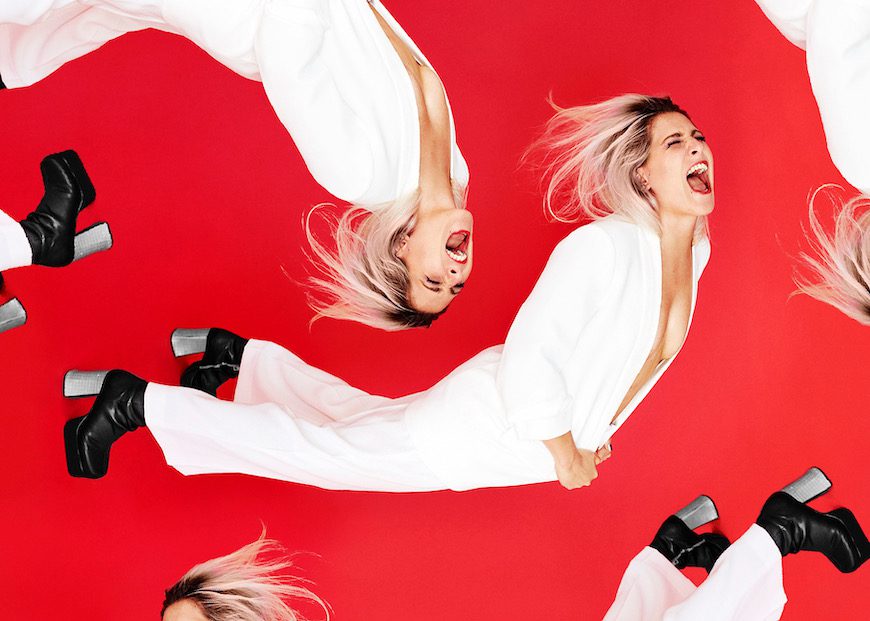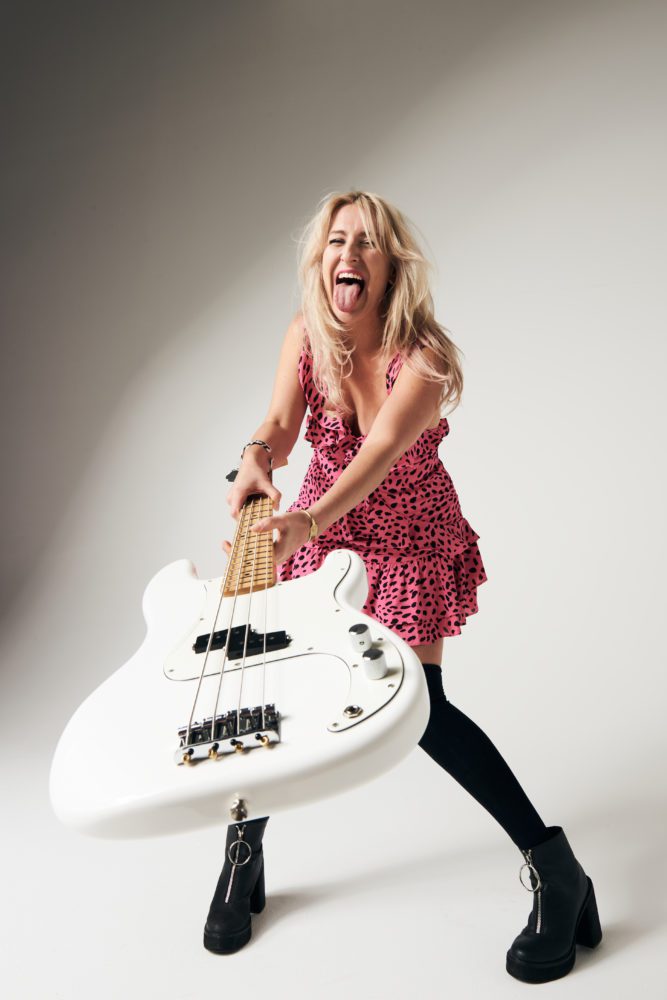

The complex emotion of shame, often unconscious or ignored, happens when cultural norms are violated or reckoned with. There’s a flipside too – the emotional aftermath of rebelling against societal expectations sometimes feels so good. Shame can be exhilarating and lead to us on the journey of life’s greatest lessons, while acting as a vehicle for the kind of catharsis needed to alchemize powerful music.
Jessica Louise Dye of High Waisted explores these varying reactions on her sophomore single “Shame,” released under the moniker Hello Lightfoot, a solo project that’s been nearly a decade in the making, Originally composed of down-tempo folk songs, Dye sidesteps the DIY surf rock chaos of High Waisted altogether to begin releasing intricate, industrial-tinged baroque pop songs. With a noir twist, the lyrics of “Shame” roll off the tongue like medieval riddles on a surrealist intergalactic quest.
“I used a fun poetry method of blacking out lines in an old book to help start my story for lyrics.” Dye tells Audiofemme. “Being forced to work in a thematic box really drove the direction of the song and inspired a dark subject matter. Soundscape wise, Kyle McCammon [a.k.a. PLUS], who produced this track, was able to bring a huge gritty, driving, pulsating to the instrumentation. I love the contrast from intense bass and guitar to light, eerie samples. I think we were able to embody the complexity of what the emotion shame would sound like in the form of a modern song.”
A glitchy montage of found footage and saturated visuals, the music video, premiering today via Audiofemme, follows Dye in an alternate digital reality. She wanders through an urban dream sequence, bleeding into images of a younger self, distorted by digital audio sound waves. Dye dances on rooftops against the New York skyline, the subway her stage, as she commands the camera clad in a mod checkered jumpsuit. Through flashing images of ultrasound clips, the video embodies the evolution of self, and loss of innocence. The chorus rings out with undertones of melodic anxiety. Fast cuts embody a restless night of sleep, subconscious pressures and repressed emotion bubbling up to surface. Disguising her eyes under thick black sunglasses, Dye remains unaffected and dignified in the motion and stance of a 1980s aerobics junkie. A lady of the night, she embraces her shame, and praises the wisdom granted through her learned experience.
A self-proclaimed extrovert, Dye dives into the deeper complex lyrical meaning behind “Shame.” The song is meant to empower, and take back control over the crippling emotion, a feeling we associate with rejection, isolation, and the inability to experience or feel worthy of love. The song exists as an anthem for moving through the emotion, embracing rather than repressing shame. Society expects one to make a mistake and never repeat it, but we all know inner human programming doesn’t flip off like a light switch. Dye coos and delivers a cunning take on empowerment of our flaws and the wisdom we gain by living recklessly and making what society may deem as “mistakes.”
“Sometimes this shameful thing I’m doing becomes heightened and also enhanced by knowing it’s shameful. Self- awareness triggers pleasure, which is sort of naughty. The chorus of ‘Shame,’ it’s my inner voice saying, “you should not be doing this, but you are, and you enjoy it more because it’s wrong,” says Dye, recognizing that the most erotic love often presents itself within complex and debaucherous interpersonal dynamics.
Written when Dye was in her mid-twenties, “Shame” was not initially heavy or drenched with grit. Instead, Dye leaned into an operatic delivery, an almost religious performance coming to terms with her demons as a vehicle for creation. “It’s almost like you’re in church, surrounded by people praying and praising shame, as if it’s passed down on you. The guitars, the melodies, explain my complex relationship to the feeling,” she says. “Having to revisit these lyrics, and go through journal entries I began to figure out what was actually going on in the undertone of my experience. ‘Muzzle be damned’ is a reference to silencing your own opinions around others as a means to be more amicable. It’s very easy to lose yourself if you’re constantly catering to the likes and dislikes of other people.”
“‘Secure your namesake/Embellish to reclaim/What you choose to ignore will tear you apart’ are my favorite lyrics in the song,” she adds. “I don’t really think I realized how powerful it was until looking back at it ten years later.”
Dye describes the resurrection of these songs, now fully actualized for her current project, as a form of spell casting through writing notes to her future self. “I think in this sense, I was expressing the self awareness of the damage I was potentially doing, living recklessly in my 20s,” she admits. “Drugs are one thing, but hurting people feels like the real crime, whether it’s emotionally or physically. I think I definitely did a lot of emotional damage to people in that period of my life. Essentially a lot of people met a much different version of who I am today.”
“The hope is that one continues to change and grow, but I don’t think everybody does. Some people get stagnant, in a stage of arrested development, stuck at a certain stage,” she continues. “I think that’s why I chose to revisit these songs and reinterpret the meaning in context of the person I’ve grown to become.”
It’s the little things, whether you’re dissecting a relationship, or looking inward, the micro glitches that you choose to ignore, or give permission to stay, that start to add up. Whether it’s excuses for bad behavior, patterns of negative thinking, or self destructive tendencies, often (and hopefully) this programming will one day implode and come to a breaking point. This inevitably becomes a catalyst for self discovery, change, and personal growth. As our culture evolves by holding space for difficult conversations surrounding mental health, shame, and creating new boundaries and formats for interpersonal, romantic, and sexual relationships, songs like “Shame” move the needle forward. Difficult emotions never live in black or white territory – rather a monochromatic spectrum of grey tone.
As a rockstar, lyricist, empath, and community organizer, Dye continues to throw iconic downtown happenings like Home Sweet Home’s Femme Fatale, and create and share new multi-faceted introspective alternative music. As she steps into her next chapter, Dye explains, “I think I’ve made progress by not giving so much power to pleasing people who feel undeserving. That’s the trick – investing in the right relationships. I think without even knowing exactly what I’m ashamed of, the actual music, the guitars, the melody, explain it.”
Follow Hello Lightfoot on Instagram for ongoing updates.




